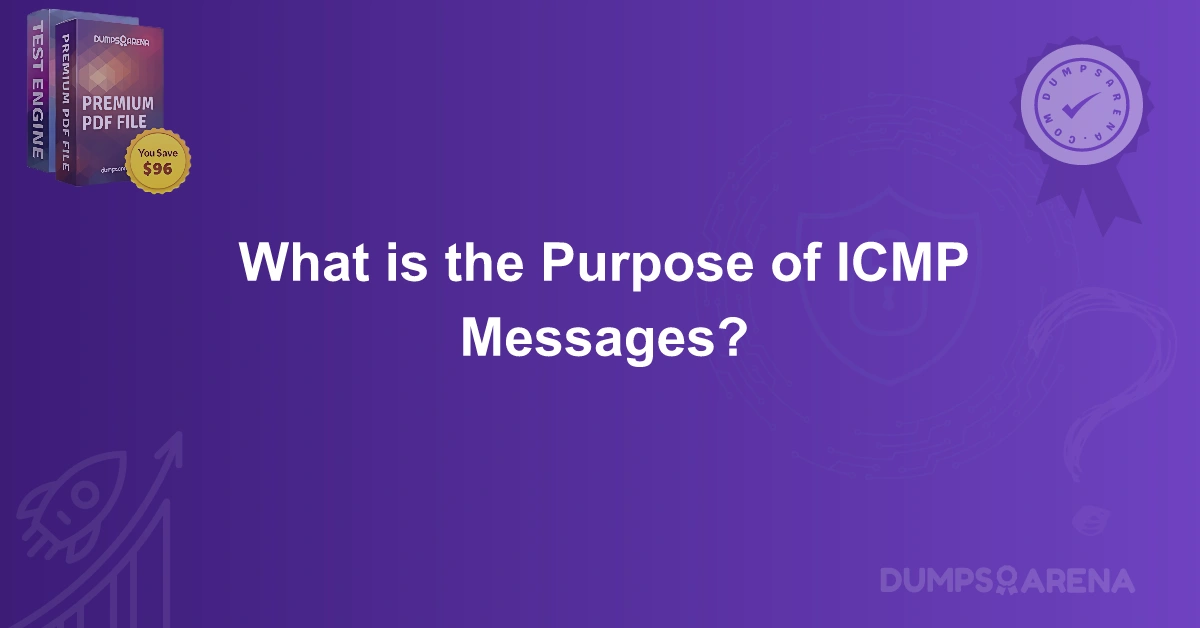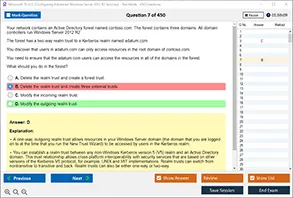Introduction
The Internet Control Message Protocol (ICMP) plays a crucial role in the maintenance and reliability of network communication. ICMP is a fundamental part of the Internet Protocol Suite, which supports communication across networks by sending control and error messages. Despite its essential nature, many individuals outside the networking domain may not fully understand the purpose and functions of ICMP messages.
This article delves deep into ICMP messages, explaining their purpose, types, and how they contribute to the smooth operation of computer networks. DumpsArena, your trusted provider for exam dumps and certification resources, presents this detailed explanation to ensure you grasp the importance of ICMP, whether you're studying for your certifications or looking to expand your knowledge.
What Are ICMP Messages?
ICMP is a network layer protocol used to send control messages within IP networks. It operates primarily for diagnostic and error reporting purposes. Unlike protocols like TCP and UDP, which focus on delivering data, ICMP’s role is to report issues related to network connectivity, traffic management, and system status. These messages are often used for tasks like pinging a network host or diagnosing a network's performance and reliability.
When an error occurs during data transmission or routing, ICMP sends a message to the sender to inform them about the issue. For example, if a router is unable to deliver a packet to its destination, it can send an ICMP "destination unreachable" message back to the sender.
The Role of ICMP in Network Troubleshooting
One of the most common uses of ICMP is for network troubleshooting. Tools like ping and traceroute rely heavily on ICMP messages to diagnose network problems.
-
Ping: This tool uses ICMP Echo Request and Echo Reply messages to check if a destination is reachable. It measures the round-trip time for packets to travel from the source to the destination and back.
-
Traceroute: This tool sends ICMP messages to determine the path that packets take from one host to another, helping network engineers identify where delays or issues occur in the network.
Without ICMP, troubleshooting network issues would be much more challenging and time-consuming.
Key Types of ICMP Messages
ICMP messages can be categorized based on their type and function. Here are the primary types of ICMP messages:
-
Echo Request and Echo Reply
These are the most well-known ICMP messages, used by the ping command. The Echo Request is sent from one host to another, and the receiving host sends back an Echo Reply, indicating that the host is reachable. -
Destination Unreachable
This message is sent when a router or destination host cannot deliver the packet to its destination. Several reasons can trigger this message, such as network congestion or an unreachable destination. -
Time Exceeded
When a packet's time-to-live (TTL) value expires, meaning it has passed through too many routers without reaching its destination, the Time Exceeded message is sent. This helps identify network loops or inefficient routing paths. -
Redirect
This message is used by routers to inform hosts about a better route to reach a destination. It is often used in network optimization and efficient routing practices. -
Source Quench
This message is sent to tell a host to reduce its rate of sending packets. It is typically used in cases where a network or router is experiencing congestion. -
Parameter Problem
This message indicates an issue with the header of the IP packet, such as incorrect field values or a malformed packet. -
Timestamp Request and Timestamp Reply
These are less common but still important ICMP messages. The Timestamp Request is sent to obtain the time at the destination host, and the Timestamp Reply provides this information.
Why Are ICMP Messages Important?
ICMP messages are essential for maintaining the stability and efficiency of networks. Here's why they matter:
-
Error Reporting
When a device cannot reach its destination, ICMP messages alert the sender, helping them understand the reason behind the failure. For example, if a router cannot forward a packet due to a network issue, an ICMP message like "Destination Unreachable" will be sent. -
Network Performance Monitoring
ICMP is the backbone of network diagnostic tools like ping and traceroute. These tools are indispensable for network administrators to monitor performance and diagnose issues like packet loss, latency, and network congestion. -
Routing Optimization
ICMP messages, especially Redirect messages, help routers optimize the routing of data. This ensures that packets take the most efficient path possible, reducing congestion and improving overall network performance. -
Traffic Management
ICMP helps manage network traffic by informing hosts when they should reduce the rate of packet transmission, thus preventing network congestion.
The Interaction Between ICMP and Other Protocols
ICMP is often used in conjunction with other protocols in the Internet Protocol Suite. While ICMP is part of the IP layer, its interaction with higher-level protocols like TCP and UDP enhances the performance and reliability of these protocols.
For example, when TCP encounters a routing or transmission issue, an ICMP Destination Unreachable message might be sent to inform the sender that the packet could not be delivered. Similarly, ICMP messages help UDP applications by providing error reporting when packets cannot reach their intended destinations.
The Role of ICMP in Cybersecurity
ICMP messages are often used for network reconnaissance and can be exploited by attackers. For instance, attackers can use ping to discover devices on a network or to test if a system is reachable. While ICMP itself is not inherently dangerous, it can be used maliciously in Denial of Service (DoS) attacks, such as a Ping of Death or ICMP Flood attack. These attacks overwhelm the target with excessive ICMP Echo Requests, causing the system to crash or become unresponsive.
To mitigate such risks, network administrators often implement ICMP filtering, which blocks or limits ICMP messages based on security policies.
Conclusion
ICMP messages are a vital component of network communication, ensuring that data transmission across IP networks is reliable and efficient. From error reporting to routing optimization, ICMP plays an integral role in the smooth operation of modern networks. For anyone pursuing a career in network administration, security, or certification exams, understanding ICMP is essential.
DumpsArena provides top-tier exam dumps and study materials to help you gain a thorough understanding of networking concepts like ICMP. Whether you’re preparing for certification exams or just looking to enhance your networking skills, DumpsArena is your go-to resource for exam success.
1.What does ICMP stand for?
A) Internet Communication Message Protocol
B) Internet Control Message Protocol
C) Internal Control Message Protocol
D) Internet Core Message Protocol
2.Which tool primarily uses ICMP for network diagnostics?
A) Traceroute
B) Ping
C) FTP
D) SSH
3.What is the primary purpose of ICMP messages?
A) To transfer data packets
B) To manage and troubleshoot network errors
C) To secure network communications
D) To encrypt network traffic
4.Which ICMP message type is used when a router cannot deliver a packet?
A) Echo Request
B) Destination Unreachable
C) Redirect
D) Time Exceeded
5.What does an ICMP Echo Reply message indicate?
A) A packet was not delivered
B) A host is reachable
C) There is network congestion
D) A routing error occurred
6.What ICMP message is used to inform a host about a better route?
A) Redirect
B) Source Quench
C) Echo Request
D) Time Exceeded
7.Which ICMP message indicates that the TTL (Time to Live) has expired?
A) Destination Unreachable
B) Time Exceeded
C) Echo Request
D) Source Quench
8.Which of the following is a feature of ICMP?
A) It ensures secure communication
B) It helps with network management
C) It encrypts data transmission
D) It splits large data into smaller packets
9.Which ICMP message is used for flow control?
A) Echo Request
B) Time Exceeded
C) Source Quench
D) Parameter Problem
10.What is the function of ICMP’s Timestamp Request and Reply messages?
A) To check the destination’s time
B) To test the network’s speed
C) To measure network congestion
D) To calculate packet delivery time
Visit DumpsArena for the latest Cisco 350-401 Exam Dumps, study guides, and practice tests. Prepare effectively for your certification and boost your chances of success with our up-to-date materials and expert resources!



